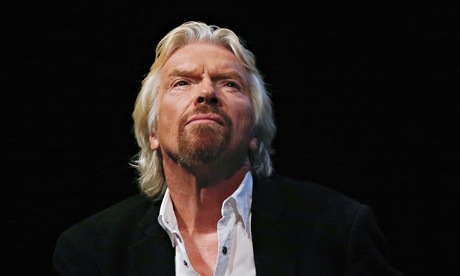
Sir Richard Branson has swung his weight firmly behind Heathrow over Gatwick as the debate over airport expansion enters a critical phase, claiming politicians have privately told him they know it is the right choice but are scared to go ahead.
With the Airports Commission preparing to lay out its evaluation of the choice for one extra runway at either Heathrow or Gatwick for public consultation, Branson said it had to be Heathrow: “We need brave politicians, who bite the bullet and say we need two new runways at Heathrow, and maybe one at Gatwick too.”
Branson, whose airline uses both London airports, said there was a danger that people would think building a runway at Gatwick alone could solve the aviation capacity problem.
“If you talk to politicians individually they know what has to happen, but if they feel they are going to lose votes they aren’t going to make the right decision or the tough decision.”
Branson blamed slot constraints at Heathrow for Virgin’s decision to retrench its network and withdraw from Tokyo, Mumbai and Cape Town in favour of more profitable transatlantic routes.
“If we want to do a new route we have to close a current route. We have no choice. That’s unlike anywhere else in the world. That will continue until a new runway or two is built at Heathrow.
“We can’t fly to South America or a whole lot of places we’d like to fly to.
“It’s difficult to make money of a route out of Gatwick when your major competitor has got a slot at Heathrow, because business people prefer Heathrow and you’ve only got to lose half a percent market share to be lossmaking rather than profitmaking.
Virgin Atlantic’s chief executive Craig Kreeger said expanding Heathrow was “a better solution in the long run for the UK” even though Virgin could suffer, depending how slots were allocated. “I could think of a lot of scenarios in which it’s bad for Virgin. But I do really believe it’s right for the UK.”
Both men were speaking in Atlanta at the inaugural flight of both the new route and the airline’s first 787 Dreamliner, a quieter and more fuel-efficient plane than its existing aircraft.
Virgin announced it has now confirmed all the options it had to buy 787-9s from Boeing, making a total of 21 planes. It will be replacing 60% of its fleet with the Dreamliners by 2018, with revamped seating and entertainment.
Kreeger said: “It is a major symbolic and real step into the future for our airline. For Virgin Atlantic the experience our customers have is what brings people back, not our network.”
However, he said the route to Atlanta, the base of its US partner airline Delta, would give Virgin passengers unprecedented access to 160 destinations in the US. “It means we can offer lots of connecting opportunities to UK customers to fly via a Delta hub, but get there on a Virgin plane.”
Next steps in the joint venture, a response to the market domination of the transatlantic routes by a similar British Airways-American Airlines partnership, will see Virgin start a second daily flight to Atlanta in March. Delta meanwhile is taking over one of Virgin’s services between Los Angeles and Heathrow.
Despite the importance of the joint venture to Virgin’s fortunes, Branson rejected recent jibes from Willie Walsh, the chief executive of British Airways’ owners IAG, that Virgin is controlled by Delta. He said: “One might as well say BA is BA-American. The fact is I own 51% of the company, I will never cede control in my life. We’re firmly in control but we’re delighted to have Delta as a partner.”
He said competition with British Airways was now “slightly more fun ... some might argue slightly childish banter, below-the-belt humour from Willie.”
He said he “very much hoped” that the resolution to the famous knee-in-the-groin bet with Walsh over Virgin’s future would take place in 2017.
“We’re counting the days down and he’d better get a strong pair of trousers if he wants to protect his, er, willy.”

